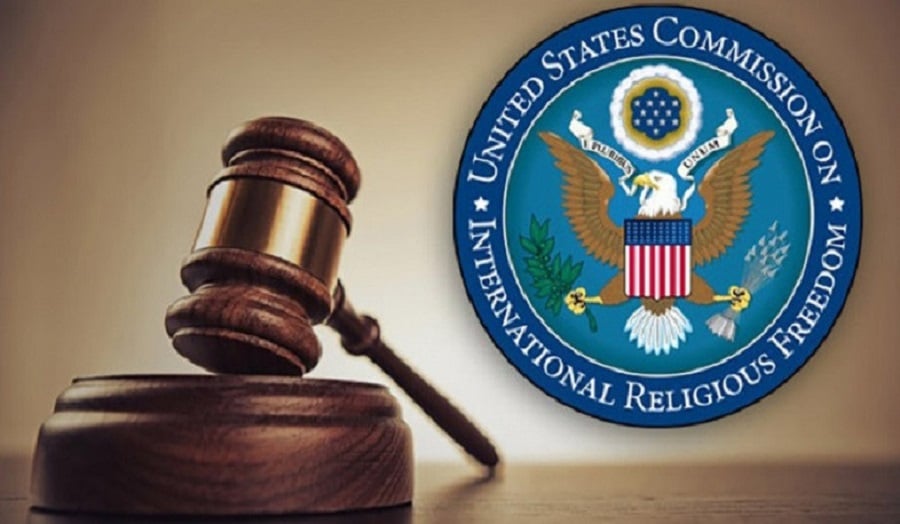Washington, D.C. – The U.S. Commission on International Religious Freedom (USCIRF) held a virtual hearing on Thursday, June 5, 2025, on Religious Freedom Conditions in Azerbaijan that highlighted political prisoners and lack of freedom of speech in the country, reported the Armenian Assembly of America (Assembly).
The hearing focused on Azerbaijan’s “concerning” religious freedoms and destruction of cultural heritage, particularly religious sites in Nagorno-Karabakh that remain threatened as Azerbaijani authorities “eliminate Armenian cultural heritage.”
In February 2025, USCIRF traveled to Azerbaijan to survey the country’s religious freedom conditions and met with religious communities, human rights activists, and government officials. In its 2025 Annual Report, USCIRF recommended that the U.S. Department of State designate Azerbaijan to the Special Watch List for “severe violations of religious freedom.”
In his opening remarks, USCIRF Chair Stephen Schneck described Azerbaijan’s law on religion as among the “most repressive in the world.” He criticized recent legislative amendments that reinforced the regime’s control and distanced the country even further from international norms.
Read also
Chair Schneck expressed concern over the Aliyev regime’’s “continued destruction and repurposing of ancient Armenian churches and other religious and cultural sites in Nagorno-Karabakh.” He urged the U.S. Department of State to maintain Azerbaijan on the Special Watch List and continue to monitor religious rights and freedoms in the country.
Commissioner Vicky Hartzler condemned the repression and brutality faced by religious groups in Azerbaijan, and called for political and economic sanctions against officials and entities involved in violating religious rights.
Commissioner Hartzler also stressed the importance of protecting Armenian religious and cultural heritage from further destruction, and recommended sending international observation missions to Nagorno-Karabakh to assess the situation and inventory the sites, calling on Congress to remain engaged in this critical issue.
The witnesses, including Audrey L. Altstadt (University of Massachusetts, Amherst), Felix Corley (Editor of Forum 18 News Service), Arzu Geybulla (Co-founder of Free Voices Collective), and Husik Ghulyan (Lead Researcher of Caucasus Heritage Watch), discussed religious freedom conditions in Azerbaijan and shared recommendations for the U.S. government to support religious freedom in Azerbaijan.
The panelists presented their findings regarding the situation in Azerbaijan, the government’s repression of religious and political rights, and the systematic destruction of Armenian religious and cultural heritage in Artsakh. They criticized the lack of international response to the policies of Azerbaijan’s autocratic regime and called for targeted sanctions, including those under the Global Magnitsky Act. They also advocated conditioning any political or economic relationship with Azerbaijan on the regime’s commitment to protecting religious, political, and other fundamental human rights.
This hearing follows last week’s International Conference on the Preservation of Armenian Religious, Cultural and Historical Heritage in Nagorno-Karabakh, that was held in Bern, Switzerland, wherein the World Council of Churches (WCC) issued a statement that they “bear witness to the erasure of millennia of Armenian Christian presence in the region and to the widespread destruction of churches, cemeteries, monuments, and other sacred and cultural sites, as documented by independent bodies such as Caucasus Heritage Watch, Save Armenian Monuments, and Monument Watch and other cultural actors.”
The organization referred to the destruction of cultural heritage as a “violation of international humanitarian law and can amount to a crime against humanity, and indicia of genocidal intent. We call on the international community, particularly the United Nations and UNESCO, to ensure accountability and uphold their mandates for the protection of cultural and religious heritage.”
Calling for coordinated international action, the WCC urged “governments and international bodies to take diplomatic and legal steps based on OSCE and other conventions to prevent further erasure of Armenian cultural heritage, support the return of the people to their land and to work actively towards the liberation of the Armenian hostages in Baku.”
Established in 1972, the Armenian Assembly of America is the largest Washington-based nationwide organization promoting public understanding and awareness of Armenian issues. The Assembly is a strictly non-partisan, 501(c)(3) tax-exempt membership organization.




















































